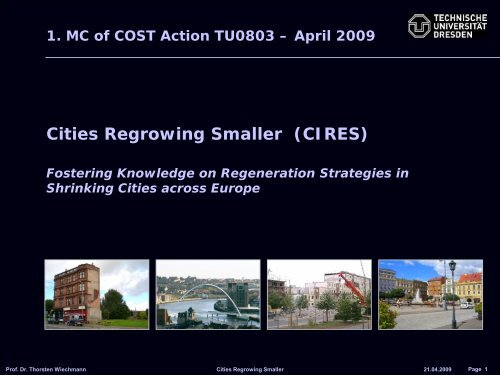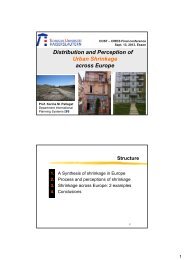Cities Regrowing Smaller (CIRES)
Action Kick-off meeting, Brussels - Cities Regrowing Smaller
Action Kick-off meeting, Brussels - Cities Regrowing Smaller
Create successful ePaper yourself
Turn your PDF publications into a flip-book with our unique Google optimized e-Paper software.
1. MC of COST Action TU0803 – April 2009<br />
<strong>Cities</strong> <strong>Regrowing</strong> <strong>Smaller</strong> (<strong>CIRES</strong>)<br />
Fostering Knowledge on Regeneration Strategies in<br />
Shrinking <strong>Cities</strong> across Europe<br />
Prof. Dr. Thorsten Wiechmann <strong>Cities</strong> <strong>Regrowing</strong> <strong>Smaller</strong><br />
21.04.2009<br />
Page 1
Content<br />
1 Background: Urban Shrinkage in Europe<br />
2 Objectives and Benefits of <strong>CIRES</strong><br />
3 Scientific Programme of <strong>CIRES</strong><br />
4 Organisation of <strong>CIRES</strong><br />
Prof. Dr. Thorsten Wiechmann <strong>Cities</strong> <strong>Regrowing</strong> <strong>Smaller</strong><br />
21.04.2009<br />
Page 2
1 Background: Urban Shrinkage in Europe<br />
Shrinking <strong>Cities</strong> in Europe<br />
A ‘shrinking city’ is defined as …<br />
…<br />
…<br />
…<br />
…<br />
a densely populated urban area with a minimum population of<br />
10,000 residents<br />
that has faced a population loss in large parts of it<br />
for more than 2 years and<br />
is undergoing economic transformations with some symptoms of<br />
a structural crisis.<br />
<br />
According to different studies every 6th to 4th large city<br />
worldwide has lost population in the 1990ies<br />
Prof. Dr. Thorsten Wiechmann <strong>Cities</strong> <strong>Regrowing</strong> <strong>Smaller</strong><br />
21.04.2009<br />
Page 3
1 Background: Urban Shrinkage in Europe<br />
Shrinking <strong>Cities</strong> in Europe<br />
Source:<br />
3. Cohesion<br />
Report<br />
EU 2004<br />
Prof. Dr. Thorsten Wiechmann <strong>Cities</strong> <strong>Regrowing</strong> <strong>Smaller</strong><br />
21.04.2009<br />
Page 4
1 Background: Urban Shrinkage in Europe<br />
EU Urban Audit: Population Development in 220 selected<br />
European large and medium-sized <strong>Cities</strong><br />
Shrinkage 1996 – 2001<br />
• Urban Regions<br />
(n = 120): 56%<br />
• <strong>Cities</strong><br />
(n = 220): 57%<br />
Source: www.urbanaudit.org<br />
Prof. Dr. Thorsten Wiechmann <strong>Cities</strong> <strong>Regrowing</strong> <strong>Smaller</strong><br />
21.04.2009<br />
Page 5
1 Background: Urban Shrinkage in Europe<br />
Common causes of shrinkage include:<br />
• suburbanization („hollowing out”, flight of people and jobs)<br />
• economic restructuring (shift away from industrial-based economy)<br />
• demographics and immigrant settlement patterns (low fertility rates;<br />
tendency of immigrants to settle in larger, growing cities)<br />
In the literature urban shrinkage has mainly been studied …<br />
…<br />
…<br />
…<br />
in terms of life cycles<br />
as the spatial manifestations of globalisation processes and growing<br />
inequalities in the current knowledge-based economy<br />
as an outcome of transformation processes in Eastern Europe<br />
Research that has been conducted lacks a comparative perspective on the<br />
factors and impacts of shrinkage at the European scale and on the policies<br />
and strategies that were implemented.<br />
Prof. Dr. Thorsten Wiechmann <strong>Cities</strong> <strong>Regrowing</strong> <strong>Smaller</strong><br />
21.04.2009<br />
Page 6
2 Objectives and Benefits of <strong>CIRES</strong><br />
The main objective of the Action is to foster the interdisciplinary<br />
knowledge of Regeneration Strategies in Shrinking <strong>Cities</strong> across<br />
Europe.<br />
At a strategic level, the network will:<br />
- provide a forum for the discussion of successful regeneration strategies in<br />
shrinking cities, establishing a frame of common action facing the multiple<br />
challenges around shrinking cities,<br />
- improve the knowledge basis for targeted policy actions by the EU or its<br />
Member States,<br />
- lay foundations for future corresponding EU research initiatives,<br />
- foster the questioning of traditional paradigms of urban development in<br />
view of the demographic and economic challenges in European cities.<br />
Prof. Dr. Thorsten Wiechmann <strong>Cities</strong> <strong>Regrowing</strong> <strong>Smaller</strong><br />
21.04.2009<br />
Page 7
2 Objectives and Benefits of <strong>CIRES</strong><br />
The main objective of the Action is to foster the interdisciplinary<br />
knowledge of Regeneration Strategies in Shrinking <strong>Cities</strong> across<br />
Europe.<br />
At an operational level, the network will:<br />
- devise a conceptual framework (incl. a common terminology) to describe<br />
and analyze issues of shrinking cities,<br />
- survey and review the existing studies on regeneration strategies in<br />
shrinking cities in Europe and elsewhere,<br />
- assess the level and nature of selected approaches to regenerate shrinking<br />
cities,<br />
- provide on-site advice to end-users of the completed research in selected<br />
shrinking cities,<br />
- offer a 'best practice' database on regeneration strategies,<br />
- provide access for young researchers to a highly innovative debate.<br />
Prof. Dr. Thorsten Wiechmann <strong>Cities</strong> <strong>Regrowing</strong> <strong>Smaller</strong><br />
21.04.2009<br />
Page 8
3 Scientific Programme of <strong>CIRES</strong><br />
How will the objectives be achieved?<br />
a.) A collective conceptual framework will be developed, including a synopsis<br />
of published research on shrinking cities and a common terminology across<br />
countries and disciplines.<br />
b.) Two European conferences on good practice on regeneration strategies in<br />
shrinking cities in the third and fourth year of the Action will provide an<br />
opportunity for the wider audience to participate in the Action.<br />
c) Workshop meetings in reference cities will allow the interchange of tacit<br />
knowledge between the network members and practitioners. By this means the<br />
Action’s proposals and recommendations can be discussed with local actors in<br />
selected shrinking cities. Thus the Action will invite local stakeholders to<br />
participate in the workshops.<br />
d.) The Action will facilitate the sharing of European best practice on<br />
regeneration strategies in shrinking cities by offering a database with profiles<br />
of selected examples from all COST countries involved.<br />
Prof. Dr. Thorsten Wiechmann <strong>Cities</strong> <strong>Regrowing</strong> <strong>Smaller</strong><br />
21.04.2009<br />
Page 9
3 Scientific Programme of <strong>CIRES</strong><br />
How will the objectives be achieved?<br />
e.) The Action will produce recommendations on policy implications at<br />
different levels which will be distributed as widely as possible to relevant policymakers.<br />
f.) Publication of the research findings, by means of one edited book on<br />
regeneration strategies in shrinking cities, six journal papers focusing on<br />
different cases of shrinkage across Europe, and one monograph on policies<br />
needed for shrinking cities as well as conference and workshop proceedings.<br />
g.) Designing and maintaining of a web site, that allows the interchange of<br />
knowledge between the network members and a wider public, through intranet<br />
and public website pages.<br />
Prof. Dr. Thorsten Wiechmann <strong>Cities</strong> <strong>Regrowing</strong> <strong>Smaller</strong><br />
21.04.2009<br />
Page 10
3 Scientific Programme of <strong>CIRES</strong><br />
4 Main Tasks:<br />
• Synopsis Engaged of Scholarship Published Diamond Research Model on Shrinking (Van de <strong>Cities</strong> Ven 2007)<br />
Review of a comprehensive sample of academic journal articles in different<br />
languages with a special emphasis on regeneration strategies.<br />
• Theory-Practice Interface on Regeneration Strategies<br />
Series of four workshop meetings in reference cities to gain a deeper<br />
understanding of causes, processes, and policy implications in the different<br />
types of shrinking cities (former mining city, old industrialised city, satellite<br />
city, comparably wealthy city with a declining and fast ageing population).<br />
• Theory Building and Interdisciplinary Communication<br />
Alternative theories and methods to deal with the issue of shrinking cities<br />
will be developed. The most important part of the conceptual framework is a<br />
common terminology across countries and disciplines.<br />
• Problem Solving Strategies and Best Practice Database<br />
This task focuses on linking the research findings back to the problem as<br />
defined in the Theory-Practice Interface.<br />
Prof. Dr. Thorsten Wiechmann <strong>Cities</strong> <strong>Regrowing</strong> <strong>Smaller</strong><br />
21.04.2009<br />
Page 11
3 Scientific Programme of <strong>CIRES</strong><br />
Typology of Shrinking <strong>Cities</strong> (Source: Wu et al. 2008)<br />
Type Characteristics Underlying Causes Selected<br />
Contemporary<br />
Examples<br />
Policy Implications<br />
(examples)<br />
Shrinkage is<br />
imposed<br />
Conflicts/war<br />
Political or<br />
economic reforms<br />
Depletion of<br />
resources<br />
Political and military conflicts<br />
Spatial/Administrative<br />
Reforms —national govt.<br />
Uneconomic exploitation of<br />
natural resources<br />
Beirut, Lebanon; Phnom<br />
Penh<br />
Chinese county towns &<br />
villages<br />
Nauru & other mining<br />
cities—including resource<br />
towns<br />
former mining city<br />
Conflict resolution<br />
Modification of<br />
administrative<br />
reforms<br />
New technology;<br />
Efficient methods of<br />
resource extraction<br />
Shrinkage due<br />
to comparative<br />
disadvantages<br />
Lack of economic<br />
opportunities/<br />
diversity<br />
Lifestyle<br />
attractions<br />
Climatic conditions<br />
Infrastructure<br />
provisions<br />
Core/periphery drift<br />
Globalization<br />
De-industrialization<br />
Re-industrialization<br />
(rise of Regional inequalities;<br />
Knowledge economy)<br />
Climatic differences<br />
Metropolitan lifestyle<br />
Poland relative to EU<br />
S. Korea -- regions<br />
outside of Seoul Metro<br />
region<br />
France (non metro Paris)<br />
Scotland<br />
NE China old industrial<br />
centers<br />
Rust belt (USA)<br />
old industrialised city<br />
satellite city<br />
Reinforce regional<br />
resilience<br />
Ensure<br />
embeddedness of<br />
economic activities<br />
Regional<br />
decentralization<br />
policies<br />
Shrinkage due<br />
to societal /<br />
global changes<br />
Absolute decline of<br />
population<br />
Ageing population<br />
Climate change<br />
Low birth rate (fertility<br />
decline)<br />
Low population replacement<br />
rate<br />
Population structure<br />
“Demographic onus”<br />
Global climate changes<br />
Dresden, Germany<br />
Kyoto, Japan<br />
Australian outback towns<br />
wealthy city with fast ageing population<br />
Population policy<br />
Urban<br />
amenities/infrastructu<br />
res investments<br />
Global climate<br />
policies/programs<br />
Prof. Dr. Thorsten Wiechmann <strong>Cities</strong> <strong>Regrowing</strong> <strong>Smaller</strong><br />
21.04.2009<br />
Page 12
4 Organisation of <strong>CIRES</strong><br />
List of experts who have been involved in the Action proposal<br />
France Prof. Dr. Sylvie Fol Université Paris 1 Panthéon - Sorbonne<br />
State: 17.04.2009<br />
France<br />
Germany<br />
A/Prof. Dr. Emmanuèle<br />
Cunningham-Sabot<br />
Prof. Dr. Thorsten<br />
Wiechmann<br />
Université Rennes 2 - Haute Bretagne<br />
Technische Universität Dresden<br />
Italy Dr. Roberta Benini University of Bologna-Ravenna Centre<br />
Poland<br />
Prof. Dr. Tadeusz<br />
Stryjakiewicz<br />
Adam Mickiewicz University, Poznań<br />
Portugal Prof. Dr. Paulo Pinho University of Oporto, CITTA - Research Centre for Territory,<br />
Transports and Environment<br />
Slovakia A/Prof. Dr. Jan Bucek Comenius University, Bratislava<br />
Slovenia Dr. Mojca Sasek Divjak Urban planning Institute, Ljubljana<br />
Spain Dr. Simon Sanchez Moral Institute of Economics, Geography and Demography, Spanish<br />
National Research Council (CSIC)<br />
UK Dr. Helen Mulligan Cambridge Architectural Research Ltd<br />
Australia<br />
A/Prof. Cristina Martinez-<br />
Fernandez<br />
University of Western Sydney, Urban Research Centre<br />
Prof. Dr. Thorsten Wiechmann <strong>Cities</strong> <strong>Regrowing</strong> <strong>Smaller</strong><br />
21.04.2009<br />
Page 13
4 Organisation of <strong>CIRES</strong><br />
State: 17.04.2009<br />
Countries: 14 + 1<br />
DE, BE, CH, DK, ES,<br />
FR, IT, MA, NE, PL,<br />
PT, SI, SK, UK, AU<br />
Prof. Dr. Thorsten Wiechmann <strong>Cities</strong> <strong>Regrowing</strong> <strong>Smaller</strong><br />
21.04.2009<br />
Page 14
4 Organisation of <strong>CIRES</strong><br />
Organisation of the COST Action<br />
Prof. Dr. Thorsten Wiechmann <strong>Cities</strong> <strong>Regrowing</strong> <strong>Smaller</strong><br />
21.04.2009<br />
Page 15
4 Organisation of <strong>CIRES</strong><br />
Working Group Tasks<br />
WG 1 will provide a Synopsis Report based on an extensive review of published<br />
work on Shrinking <strong>Cities</strong> (summary report 'Synopsis of Published Research on<br />
Shrinking <strong>Cities</strong>' in phase 2; revision in phase 5). It will also act as organising<br />
committee for the European conference on Regeneration Strategies in<br />
Shrinking <strong>Cities</strong> as well as for the Final conference of COST Action ‘<strong>Cities</strong><br />
<strong>Regrowing</strong> <strong>Smaller</strong>’. This includes the responsibility for the editing of the<br />
Synthesis Report with the findings of the workshops and conferences.<br />
The Theory-Practice Interface will be prepared and organised by WG 2. In<br />
phase 1 this WG will compile a tentative list of potential reference cities (as<br />
basis for selection process in the MC). In the following phases WG 2 focuses on<br />
the preparation and organisation of the series of workshop meetings in four<br />
reference cities with the involvement of academics and practitioners. Hence,<br />
WG 2 also acts as organising committee for the four workshops in reference<br />
cities. This includes the support and monitoring of four Short Term Scientific<br />
Missions to prepare these workshop meetings.<br />
Prof. Dr. Thorsten Wiechmann <strong>Cities</strong> <strong>Regrowing</strong> <strong>Smaller</strong><br />
21.04.2009<br />
Page 16
4 Organisation of <strong>CIRES</strong><br />
Working Group Tasks<br />
WG 3 will set up the conceptual framework for the whole Action and thus<br />
provide a theoretical-methodological basis for the whole Action. To this end the<br />
WG will produce a Summary Report on the 'Conceptual Framework' at the<br />
outset of phase 3. This will include a common terminology (Glossary on<br />
Regeneration Strategies in Shrinking <strong>Cities</strong> across Europe). In the final phase<br />
WG 3 will revise the 'Conceptual Framework' and edit the final reporting of the<br />
Action as well as the book publication.<br />
WG 4 will focus on assembling instructive cases of regeneration strategies. It<br />
will be in charge to produce the Best Practice Database, the corresponding<br />
Report and a map of shrinking cities in Europe. Following up the European<br />
conference on Regeneration Strategies in Shrinking <strong>Cities</strong> this WG will also<br />
carry out the comparative analysis of different regeneration strategies in phase<br />
4 and the editing of the monograph on policy implications in phase 5.<br />
Prof. Dr. Thorsten Wiechmann <strong>Cities</strong> <strong>Regrowing</strong> <strong>Smaller</strong><br />
21.04.2009<br />
Page 17
4 Organisation of <strong>CIRES</strong><br />
Working Group constitution<br />
• a maximum of 2 members per COST country are reimbursable<br />
(if budget is sufficient)<br />
• WG members do not have to be MC members<br />
(basically every scholar from the participating countries can be invited)<br />
• to reduce on the one hand the expenditure of time and on the other hand<br />
travel and accommodation costs the Action will combine workshops with<br />
meetings of all 4 WG with MC meetings (thus nobody is excluded from a<br />
certain WG)<br />
Prof. Dr. Thorsten Wiechmann <strong>Cities</strong> <strong>Regrowing</strong> <strong>Smaller</strong><br />
21.04.2009<br />
Page 18
4 Organisation of <strong>CIRES</strong><br />
Working Group constitution: proposal for discussion<br />
MC WG 1 WG 2 WG 3 WG 4<br />
Cristina Martinez-Fernandez AU p [X] X<br />
Jean-Marie Halleux BE X X<br />
Maresa Schumacher CH X X<br />
Karina Pallagst DE [X] X<br />
Thorsten Wiechmann DE X X<br />
Philipp Oswalt DE X X<br />
Lea Louise Holst Laursen DK Xp Xp<br />
Simón Sánchez ES X X<br />
Manuel Fernandez-Esquinas ES X X<br />
Ricardo Mendez Gutierrez ES sub X X<br />
Jose Prada Trigo ES sub X X<br />
Sylvie Fol FR X X<br />
Emmanuèle Cunningham-Sabot FR [X] X<br />
Hélène Roth FR X X<br />
Roberta Benini IT X X<br />
Vincent Buhagiar MT Xp<br />
Jesmond Xuereb MT Xp<br />
Marco Bontje NE X X<br />
Prof. Dr. Thorsten Sako Wiechmann Musterd NE <strong>Cities</strong> <strong>Regrowing</strong> X <strong>Smaller</strong><br />
X<br />
21.04.2009<br />
Page 19
4 Organisation of <strong>CIRES</strong><br />
Time table of the COST Action TU0803<br />
Prof. Dr. Thorsten Wiechmann <strong>Cities</strong> <strong>Regrowing</strong> <strong>Smaller</strong><br />
21.04.2009<br />
Page 20
4 Organisation of <strong>CIRES</strong><br />
Time table of the COST Action TU0803<br />
What? Who? Where? When? How long?<br />
Kick-off meeting MC member Brussels 20./21. April 2009 1 day<br />
MC / WG meeting all WG’s, plus MC Paris 1. / 2. Sep. 2009 1 ½ days<br />
1. Workshop Meeting all WG’s, plus MC Reference City A 18./22. Nov 2009 2 ½ days<br />
Core Group meeting Chair, Vice-Chair, WG leader ? March 2010 1 day<br />
2. Workshop Meeting all WG’s, plus MC Reference City B 19./21.May 2010 2 ½ days<br />
3. Workshop Meeting all WG’s, plus MC Reference City C January 2011 2 ½ days<br />
Core Group meeting Chair, Vice-Chair, WG leader ? July 2011 1 day<br />
4. Workshop Meeting all WG’s, plus MC Reference City D October 2011 2 ½ days<br />
European conference all partners (incl. MC) ? March 2012 2 days<br />
Core Group meeting Chair, Vice-Chair, WG leader ? July 2012 1 day<br />
Final conference all partners (incl. MC) Brussels? October 2012 1 day<br />
MC / WG meeting all WG’s, plus MC ? November 2012 1 ½ days<br />
Prof. Dr. Thorsten Wiechmann <strong>Cities</strong> <strong>Regrowing</strong> <strong>Smaller</strong><br />
21.04.2009<br />
Page 21
4 Organisation of <strong>CIRES</strong><br />
Deliverables<br />
- State of the art report on Regeneration Strategies in Shrinking <strong>Cities</strong> (will<br />
provide an overview of the current state of the art in theory and practice).<br />
- Map of shrinking cities in Europe<br />
- Six scientific papers in peer-reviewed journals (from cooperation between<br />
members) focusing on different types and cases of shrinkage across Europe<br />
- Regularly updated Action Website.<br />
- Proceedings of major conferences.<br />
- Monograph on policy implications, including recommendations for policy<br />
makers on different levels.<br />
- European Conference on Regeneration Strategies of Shrinking <strong>Cities</strong> and<br />
a final Conference at the end of the COST Action<br />
- Synthesis Report with the findings of the workshops and conferences.<br />
- Handbook on Regeneration Strategies in Shrinking <strong>Cities</strong>.<br />
Prof. Dr. Thorsten Wiechmann <strong>Cities</strong> <strong>Regrowing</strong> <strong>Smaller</strong><br />
21.04.2009<br />
Page 22
1. MC of COST Action TU0803 – April 2009<br />
<strong>Cities</strong> <strong>Regrowing</strong> <strong>Smaller</strong> (<strong>CIRES</strong>)<br />
Fostering Knowledge on Regeneration Strategies in<br />
Shrinking <strong>Cities</strong> across Europe<br />
Prof. Dr. Thorsten Wiechmann <strong>Cities</strong> <strong>Regrowing</strong> <strong>Smaller</strong><br />
21.04.2009<br />
Page 23






